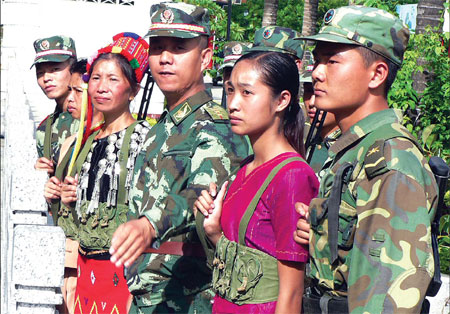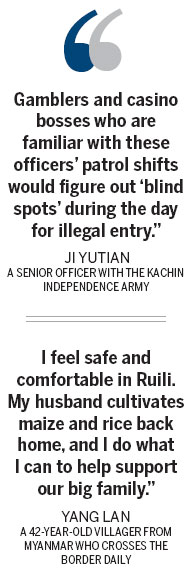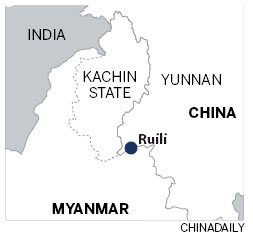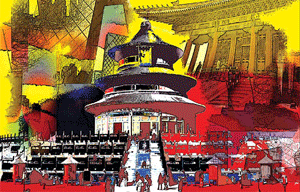A town that gambled on a change
Updated: 2011-11-07 07:07
By Zhang Yan, Li Yao and Hu Yinan (China Daily)
|
|||||||||
An estimated 10 million people annually cross the Myanmar border at Ruili, a town in China's southwestern Yunnan province. Many belong to the Dai and Jingpo ethnic groups. Their communities straddle the border and, until recently, they crossed it without hindrance.
 |
|
Local militias join border officers in patrolling Ruili's 4.2-km line between China and Myanmar. The local inspection station has 24 patrol officers on duty at any one time.[Photo/China Daily] |
But as border trade prospered in the absence of concrete regulations, so did gambling, prostitution and trafficking, both in people and drugs. About 75 percent of China's first HIV/AIDS cases were found in Ruili in 1989, three years before border trade even officially began.
In 1999, Time magazine, citing the casinos, massage parlors and beauty salons (a popular cover for prostitution), called it "the only real nighttown in the People's Republic of China".
Those days are long gone. Authorities on both sides of the border declared war on gambling and organized crime in 2005 following a series of kidnappings, for ransom, of Chinese nationals by casino owners in Myanmar.
Casinos in neighboring Kachin state were shut, and their water and power supplies cut off and road access blocked. The popular one-day travel permits for Chinese tourists to these areas were suspended. Travel agencies were banned from taking tourists there for gambling.
The number of officers patrolling the 4.2-kilometer border in Ruili at any given time was doubled from a mere dozen. The entire inspection station employs more than 200 people, although most of them still work in the office. And for those who do patrol, they no longer have to do so on foot, as the station is now equipped with cars and closed-circuit television.
A larger, multilateral antigambling initiative cut the number of casinos along China's borders with Myanmar, Russia, the Democratic People's Republic of Korea and Vietnam. Where 149 casinos operated in 2005, there were 28 by early 2007, figures from the Ministry of Public Security showed.
In February, the Lao government said it would not allow any more casinos to be built. Its four existing casinos attract many gamblers from China, the Xinhua News Agency said.
Chinese bettors
Ruili is relatively stable today, but the sheer complexity of the region and mounting pressures by its increasingly violent and confrontational drug traffickers and terrorists should not be underestimated, said He Jialin, head of Ruili's frontier inspection station.
As with all border towns, Ruili presents challenges for local officials. Gambling is illegal in China and now in Kachin, too, but it is still in demand. China loses about $94 billion a year to other countries through illegal betting - via bookies and the Internet, for example - according to the China Center for Lottery Studies at Peking University.

Border casinos from the country's northeast to its southwest, meanwhile, are mostly Chinese-owned and cater specifically to Chinese. If their operations are confined to territory outside China, enforcement options are limited for China's border patrol or its army, which is now responsible for defense affairs of the frontier inspection station in Ruili.
The frontier station itself has no law enforcement power, even within Ruili, and is therefore not entitled to penalize law offenders, said Jin Wanglu, head of the station's political department. If they found any people breaking the law they would hand them to the local public security bureau.
'Getting much better'
With clear regulations in place, cleaner streets, improved amenities and persistent efforts to combat crime, Ruili appears to have returned to order. Corrupt officials who squandered vast sums of public money in border casinos here, and the ones who operated them, have been imprisoned.
Kang Zhenglong, an official with the Ruili branch of Industrial and Commercial Bank of China, was at the core of China's biggest online gambling bust and was sentenced in 2008 to 19 months in prison. As part of a cross-border gambling ring that profited $31 million in seven months, Kang helped open several hundred bank accounts for money laundering.
With people like Kang out of the way, Ruili has worked hard to shake its reputation. A joint inspection force of patrol officers - these are armed paramilitary forces but are neither army nor police - plus local police and volunteer residents has been set up in Ruili to maintain order and make timely reports about thefts, robberies and street fights. In addition, the Ruili border police now meet regularly with their Myanmar counterparts on intelligence, border management, and repatriation of cross-border suspects.
A local jewelry trader, who identified himself only as Li, said things are "getting much better" around the border.
"The local government has created a sound environment and favorable conditions for us to do business. And as border trade booms, more and more people from Myanmar are coming over to do business here, where we live in harmony and engage in fair competition," he said.
The value of imports and exports in Ruili was $1.3 billion last year, up from $157 million in 2000, official figures show. In April 2010, the National Development and Reform Commission, China's top economic planner, identified Ruili as one of the country's four key pilot border sites of opening-up. The others are Dongxing of Guangxi, Kashgar of Xinjiang, and Manzhouli of Inner Mongolia.
Coming and going
Residents at the border have never been strangers to moving back and forth for work, trade, marriage or family visits. Yang Lan, 42, a villager from Myanmar, has no relatives on the Chinese side but nonetheless crosses the border daily. She shops, does day labor and makes occasional visits to rural clinics in Ruili, which offer free medical checkups for all.

For Yang, the 40 or so yuan ($6) daily pay she receives for construction work - roughly half of what her Chinese peers receive - is sufficient to help her support the family.
"I feel safe and comfortable in Ruili. My husband cultivates maize and rice back home, and I do what I can to help support our big family," said Yang, a mother of six.
Crossing the border isn't headache-free, however, for those who make a living doing border business. Stricter crossing lineups at Ruili's three checkpoints with Myanmar are time-consuming and hardly effective.
Aung Aung Kyaw, 22, lives in Myanmar's Muse town directly opposite Ruili, and crosses the border every other day as he prepares to open a jewelry store on the Chinese side. He endorses efforts to strengthen management at the Chinese border, but says it takes too long for people to obtain a border pass each time.
Refuge and risk
Meanwhile, patrol officers in Ruili say that with a small police force fragmented along the border, a limited budget and outdated weapons and telecommunications equipment, the challenges for securing the border are enormous.
On an average day, the Ruili frontier inspection station checks 6,800 vehicles and up to 30,000 people who cross the border, according to figures the station provided. That translates to a minimum daily workload of 150 to 200 vehicles and 1,000 to 1,500 people for each patrol officer.
"Gamblers and casino bosses who are familiar with these officers' patrol shifts would figure out 'blind spots' during the day for illegal entry," said Ji Yutian, a senior officer with the Kachin Independence Army (KIA), the military wing of Kachin state's ruling Kachin Independence Organization. Aside from his role with the militia, Ji has been doing jewelry business in Ruili for years.
Just across the border from Ruili, the KIA has been fighting the Myanmar government army since the latter scrapped a 17-year-old ceasefire agreement in June and launched military offensives in the region. Weapons have been fired, and both sides have reported casualties.
According to China's foreign ministry spokesman, Hong Lei, some Myanmese living in the border area have entered China seeking temporary refuge since the confrontation in June. China has given them the necessary help, he said at a news conference in July.
The military campaign may have effectively ended gambling in Muse, where casinos reopened after earlier antigambling efforts. According to the Thailand-based Kachin News Group, these casinos were still active in spring 2009. It has not reported on local casino activities since then, but Ji, the KIA officer, said "at least a dozen" are still operating underground.
The influx of Myanmese into China because of military confrontations on the other side of the border poses potential security risks, said He with the Ruili frontier inspection station. He did not give an official estimate on the number of Myanmese who have entered China since summer.
A costly lesson
But the times are peaceful in Ruili, where only stories told by survivors of past tragedies are reminiscent of its more turbulent days. A man who narrowly escaped from a Myanmar casino after 12 days of detainment in July 2003 regrets the impulse to gamble each time he tells his story.
Chen (he gave only his surname) was on a trip to invest in Yunnan, but instead ended up losing all the money he had - $63,000 - overnight in a casino in Myanmar. Determined to win his money back, Chen borrowed from the casino's owners, with interest more than twice that amount, and again lost.
Chen, now doing business in Zhejiang province, still comes to Yunnan and occasionally crosses into Myanmar. But he has quit gambling.
"Nobody will ever get anything out of a casino. I was lucky enough to come out of it in time and realize its harms," said Chen, who now has a 5-year-old son.
In Ruili, Ji, the KIA officer-businessman, said the days when he always had to go out with a knife for self-defense and worry about his family's safety are far behind him.
"I don't have safety concerns when I go out alone in the night anymore. The entire city is now prettier and cleaner, and there are favorable policies for us to do jade business here," he said.
Guo Anfei contributed.











